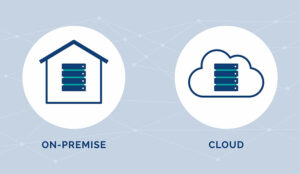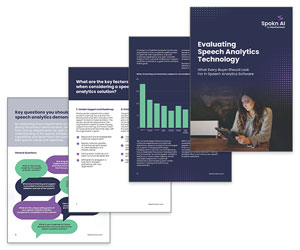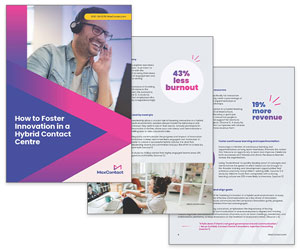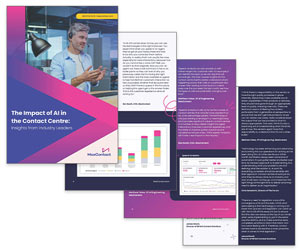The team at Max Contact shares this guide which details how cloud software can overcome objections we hear every day.
After the events of the last year, contact centre and IT managers are looking at their dialler technology and asking if it could be improved. The Covid pandemic emphasised the advantages of cloud-based solutions in all sorts of areas, and contact centre software was no exception.
You probably know the script by now. Cloud-based software allowed agents to swiftly and smoothly transition to remote working almost overnight. It gave them all the features they had on their office handsets, only anywhere and on any device. It allowed managers to monitor productivity remotely.
In a nutshell, cloud was just a lot easier in a crisis than on-premise solutions.
And yet, many contact centre/IT managers still have doubts moving outbound operations to the cloud. That’s understandable. Handing control over crucial infrastructure to a third party is a leap of faith. When sensitive data and painstakingly nurtured customer relationships are at stake, it’s natural to be cautious.
That’s why, in the rest of this guide, we want to look at cloud diallers from a contact centre manager’s perspective. We’ll detail four of the objections we hear every day and explain how the latest cloud software overcomes them.
Objection: We Won’t Be in a Crisis Forever
The pandemic will end, life will go back to normal, and agents will be back in the office, right? Well, maybe.
While it’s true that we are slowly emerging from the current lockdown, nobody knows if it will be the last. And many experts speculate that socially distanced offices may be the norm for at least another year, and perhaps longer.
So why struggle on with inflexible on-premise software? It’s widely accepted that cloud solutions make it easier to equip remote workers, and many of your best agents probably want to keep at least some degree of flexible working even when the pandemic ends. Companies that offer hybrid working as standard (when working time is split between home and office) will have a recruitment and retention advantage.
Quite simply, the best agents will favour businesses that give them more flexibility over where and when they work. Cloud-based solutions make that easier.
Objection: We Can’t Afford Ongoing Cloud Fees
Many leaders and FDs like the one-off fee of traditional contact centre solutions. You buy it, and you own it. A cloud licence is essentially a rental agreement that has to be renewed every month.
But does that make cloud more expensive? No, for lots of reasons. With cloud, there are no upfront costs beyond handsets (or you can use softphones or bring-your-own-device for free) and no ongoing maintenance fees. Updating and upgrading is handled remotely by your provider, freeing up IT staff time for more productive tasks. You don’t have the hardware refresh cycle of buying new hardware typically every 3-5 years. Plus, you never pay for capacity you can’t use.
This last point is important. With a cloud dialler, you can scale up your requirement with a couple of clicks. You can scale down again just as easily. You never have to invest in spare capacity ‘just in case’.
It’s the same with features and functionality. When you buy a desktop software solution, it’s essentially static. When a new upgraded version comes out, you have to invest all over again.
With cloud, your licence fee covers updates, upgrades and new functionality – you get built-in security, high availability and infinite scalability. At MaxContact, we drive a continual cycle of innovation, and new features are pushed out to customers automatically (you can choose whether you want to use them or not).
We could go on, but suffice to say that, when you take all this together, cloud is both more agile and more cost-effective than on-premise equivalents.
Objection: We Love the Features We Have
We get it. Your current set-up comes with a host of productivity-enhancing features and a predictive dialler that means your agents spend more time talking to customers and less time on unanswered calls. It’s a lot to give up.
Well, it would be if cloud-based alternatives couldn’t do better. As we mentioned above, the beauty of cloud is that it allows for continual innovation, and that includes regular data-driven tweaks to performance algorithms. In MaxContact’s case, that’s made for a predictive dialler which performs far better than industry standards.
Let’s put it this way. Most diallers (on-premise and cloud) advertise a 300% uplift over manual dial. We set the bar higher, aiming for that level of uplift not just over manual dial but over other diallers too. Our outbound solution also manages itself over the course of a day, automatically optimising performance while you get on with other tasks.
With cloud, you don’t just get all the normal dialler features. You get new features as soon as they’re available. Typically with SaaS, customers benefit from 10 times more updates in a year than onsite dialling solutions – which normally offer an upgrade every six months.
And of course, you get full compliance, which in MaxContact’s case also means built-in proprietary features that reduce the chance of dropped calls.
Objection: Cloud Is a Security Risk
All SaaS creators have faced this objection at one time or another, and it’s probably the biggest leap of faith contact centre managers have to make. You’re dealing with sensitive data. Any breach could threaten your reputation, your revenue and your future, so you’re right to be wary.
But in 2021, the best way to protect your data is in the cloud. Don’t just take our word for it. In the most recent KPMG/Oracle Cloud Threat Report, three-quarters of IT and cybersecurity professionals felt the cloud was more secure than their own data centre.
How does security pan out with cloud contact centre solutions? Well, MaxContact’s services are hosted on the Microsoft Azure public cloud, which is backed by Microsoft’s huge security investment and the latest global security standards. By working with Azure, our solution is automatically protected by regular intrusion-detection monitoring, penetration testing and virus scanning.
Security is also at the core of our software development. We rigorously test everything ourselves, and then we employ third-party experts to test everything again – and again. The upshot is a highly secure solution on a highly secure network.
That’s the high-level view. You can read lots more detail about our industry-leading security here and our implementation of everything from end-to-end encryption to customisable access permissions. Suffice to say that, with the right solution, security is no longer an obstacle to enjoying all the efficiency, productivity and cost benefits of cloud.
This blog post has been re-published by kind permission of MaxContact – View the Original Article
For more information about MaxContact - visit the MaxContact Website
Call Centre Helper is not responsible for the content of these guest blog posts. The opinions expressed in this article are those of the author, and do not necessarily reflect those of Call Centre Helper.
Author: MaxContact
Published On: 29th Apr 2021 - Last modified: 4th May 2021
Read more about - Guest Blogs, MaxContact




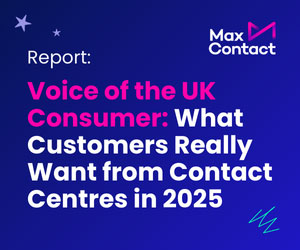

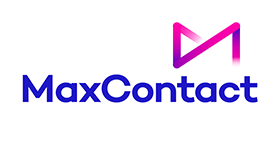 MaxContact is customer engagement software that goes above and beyond to build smarter customer experiences. Our platform is packed with powerful features, accessible for businesses large and small, and ensures organisations can operate compliantly.
MaxContact is customer engagement software that goes above and beyond to build smarter customer experiences. Our platform is packed with powerful features, accessible for businesses large and small, and ensures organisations can operate compliantly. 

